Ranking Every John Cena WrestleMania Match From Worst To Best
A look at Big Match John's biggest matches...

Mar 14, 2018
So it turns out that John Cena, after trying various avenues to get to WrestleMania, finally remembered that he is John Cena. He appeared on Monday Night Raw, and rather than try to forge a path via winning a championship or securing a number one contender spot, simply called out The Undertaker.
The Deadman's exploits at WrestleMania are legendary and are a big reason why he is considered one of the greatest WWE Superstars of all time. Cena - also one of the biggest wrestlers ever to compete under Vince McMahon - has a less heralded 'Mania legacy. He's found success (and failure) on the grandest stage of all, of course, but his matches aren't spoken of in the same way as 'Taker's epics against Shawn Michaels, Edge, CM Punk, and Triple H.
So it's time to cast the spotlight on John Cena's WrestleMania history. His matches may not be as universally praised as those of his potential opponent in New Orleans, but they still form an important part of modern WWE history.
From misguided booking experiments to underrated classics, we're going to take a look at Big Match John's biggest matches, and rank them. Because we love lists.
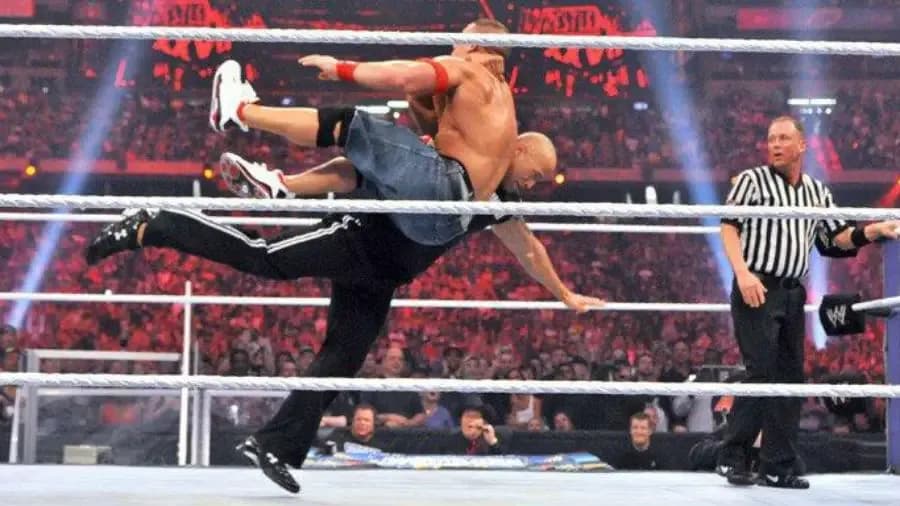
Cena has headlined five WrestleManias, and unfortunately, one is often mentioned in discussions of the worst 'Mania main events of all time.
Although not
quite
as big a booking disaster as Hogan vs. Yokozuna in 1993, or as massive an organisational shambles as Hogan vs. Sid the year prior, his showdown with The Miz still leaves a sour taste in the mouth.
The match itself wasn't spectacular, but hardly a farce either. The main problem, however, was in the booking. When The Rock restarted the bout after a double count out, only to interfere himself and cost John Cena, it became apparent that the main event of WrestleMania XXVII was being used to set up the following year's show.
In terms of Cena's 'Mania matches, this may not have been the sloppiest - but it was certainly the most insulting to fans.
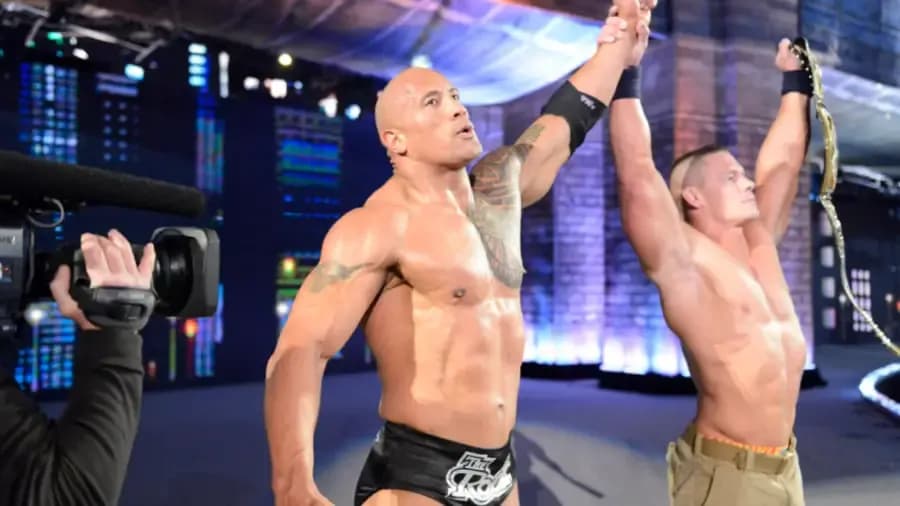
WrestleMania XXVIII's 'Once in a Lifetime' match exceeded expectations, I think it's fair to say. The Rock proved that he hadn't lost his in-ring ability, and the star power of the match was naturally off the charts.
However, if you take that match and strip away all suspense regarding the winner (and add in an unfortunate injury to one of the competitors), you get the rematch the following year.
The 2012 clash was such a success in terms of drawing power, WWE can't
really
be blamed for repeating the trick. However, they can be blamed for their booking unoriginality. The Royal Rumble saw Cena become number one contender, and Rock dethrone CM Punk (ending the title run of a lifetime) to set up a sadly predictable rematch.
Due to Rock's abdominal injury partway through, the action wasn't as crisp as the year before - nor was the atmosphere as good, due to the inevitability of Cena's eventual win.
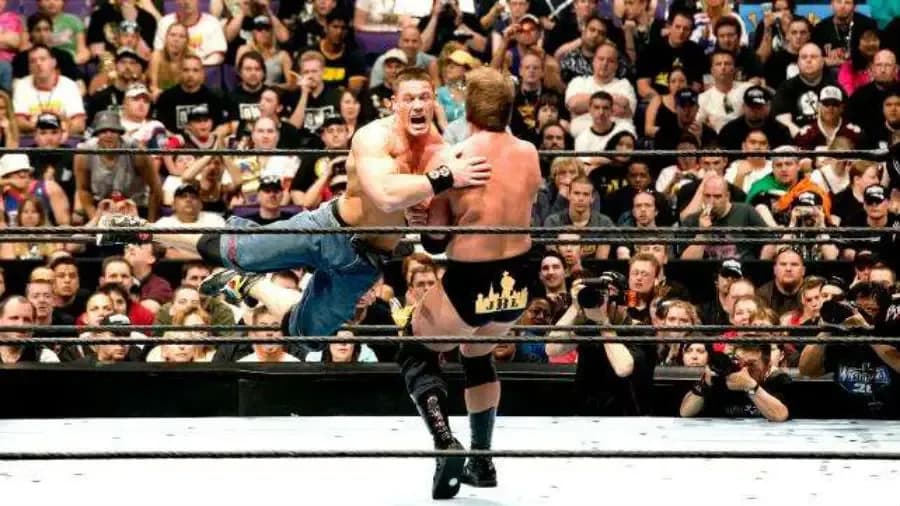
Contrary to the prior too matches, the booking of Cena's feud with JBL was absolutely solid - but the match itself can be seen as something of a letdown.
The 2005 Royal Rumble established Batista and Cena as the leaders of a new generation, and WrestleMania 21 catapulted them to the top of the card. However, Cena's victory here was completely overshadowed by Batista's epic triumph over Triple H in the main event.
This match lasted a shade over 10 minutes, pretty short for a 'Mania title match, and largely consisted of JBL beating the hell out of his challenger. Cena eventually popped up and overcame the odds - as he would go on to do throughout his career - and although it was an exciting, feel-good moment, it is not a match which stands out in the memory at all.
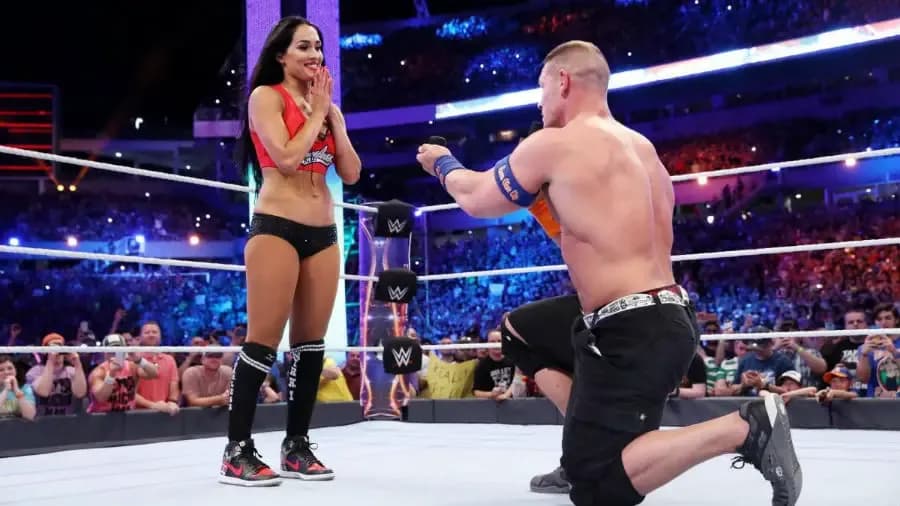
I've ranked this match above Cena vs. JBL for one reason. Both were bouts that could have happened on any pay per view - or even some episodes of Raw - but happened to take place at WrestleMania. This mixed tag bout has the edge, however, because Cena was deliberately given a reduced role at 'Mania 33 - whereas his title win at 21 was supposed to be a large moment in the show.
Cena teamed up with girlfriend Nikki Bella to take on The Miz and Maryse. After a fun (slightly house show-esque) match, the babyfaces won and became engaged in the middle of the ring. It was a nice moment, despite not being the most spectacular in terms of in-ring action.
Thankfully, this match never pretended to be one of the more serious on the show. It was a lighter moment amongst epic showdowns such as Lesnar vs. Goldberg and Reigns vs. Undertaker.
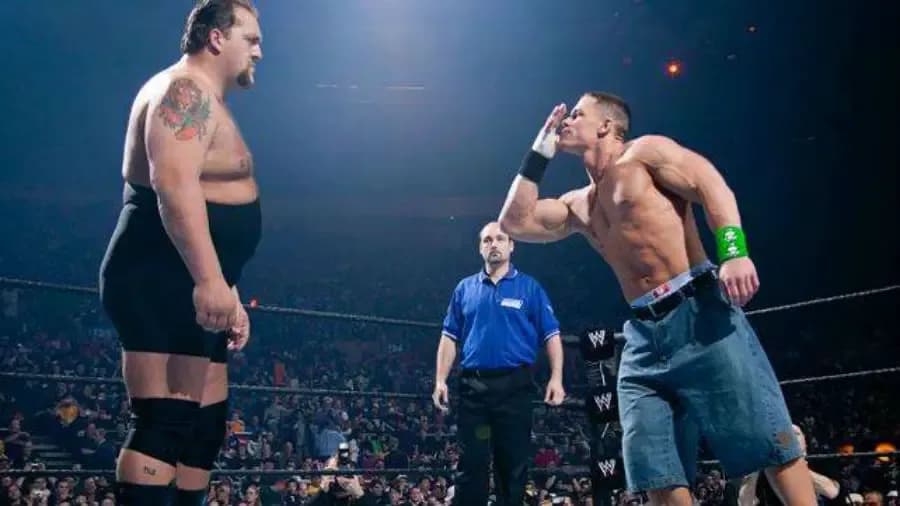
WrestleMania XX saw one of the defining moments of Cena's early career - his first title win in a US Championship showdown with Big Show.
The match opened the show and was a good choice to do so, a straight heel vs. babyface encounter with the good guy triumphing after a struggle.
The action itself wasn't particularly special - and could even be described as a little sloppy - but this match's heart was in the right place. Cena won after the obvious (but satisfying) visual of him lifting the giant for a thunderous FU, almost a mini version of Hogan/Andre at WrestleMania III.
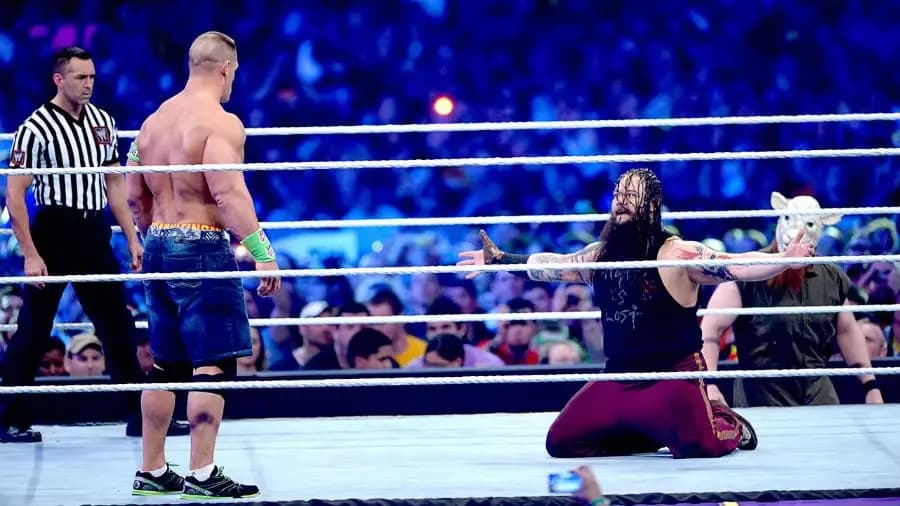
After his ludicrously big pair of matches against The Rock, Cena's role in WrestleMania diminished over the next few years. He wrestled against upper-mid-card opponents at both 'Mania 30 and 31, before failing to compete at 32 through injury.
Those two matches in 2014 and 2015 are very similar, in that both feature Cena defeating a hot upper-mid-carder who could have
really done with a win
.
Both matches were good in terms of sheer in-ring action, but I've ranked this one slightly lower because it could be seen as the starting point of Bray's downward spiral. The whole feud was built around encouraging Cena to 'embrace the hate', or change his goody-two-shoes ways, only for John to resist the temptation and defeat Wyatt by conventional means. It was one of those finishes where it seemed as though more should have happened.
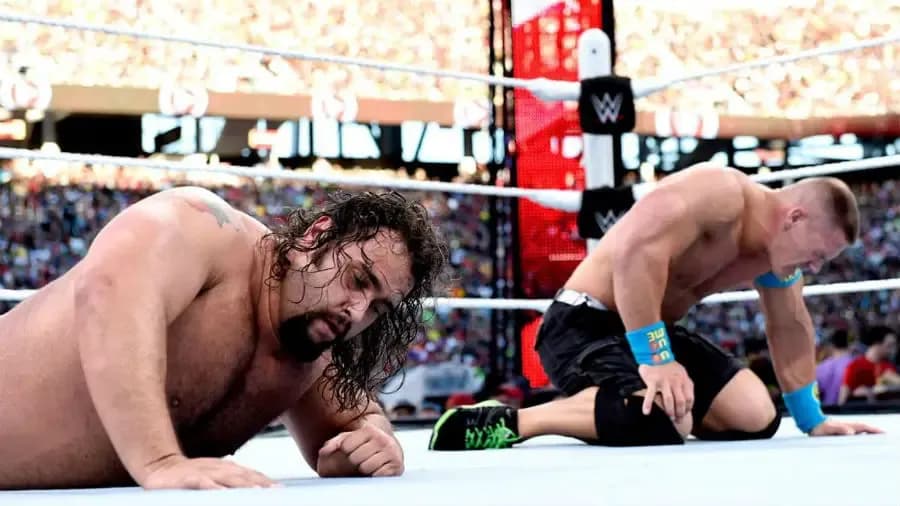
Like his match with Bray the year before, Cena's bout against Rusev saw the highly-decorated ultra-star defeat a newer wrestler who could have really benefitted from a big victory.
Rusev was
over
during this feud, although maybe not quite as much as he is these days alongside Aiden English. Still, he made one of the greatest WrestleMania entrances of all time, rumbling to the ring in a gigantic tank.
Cena played Hogan here, defeating the evil foreign heel to cement the power of America. It felt pretty outdated, but didn't damage Rusev as much as defeat hindered Wyatt the year prior.
WrestleMania XXV is primarily remembered for the unbelievable clash between Shawn Michaels and The Undertaker - and that's about it. The bout was so good, it overshadowed just about everything else on the show, and the World Heavyweight Championship Triple Threat between Cena, Big Show, and Edge is no exception.
That's a shame, because while the bout didn't contain any fireworks, it didn't promise any either. It was simply an enjoyable three-way match, pitting Cena against two of the biggest heels on SmackDown.
Big Match John won the match clean, at one stage lifting both opponents into position for an Attitude Adjustment. Ultimately, despite following arguably the greatest 'Mania match of all time, this contest still succeeded in terms of providing harmless fun for an exhausted crowd.
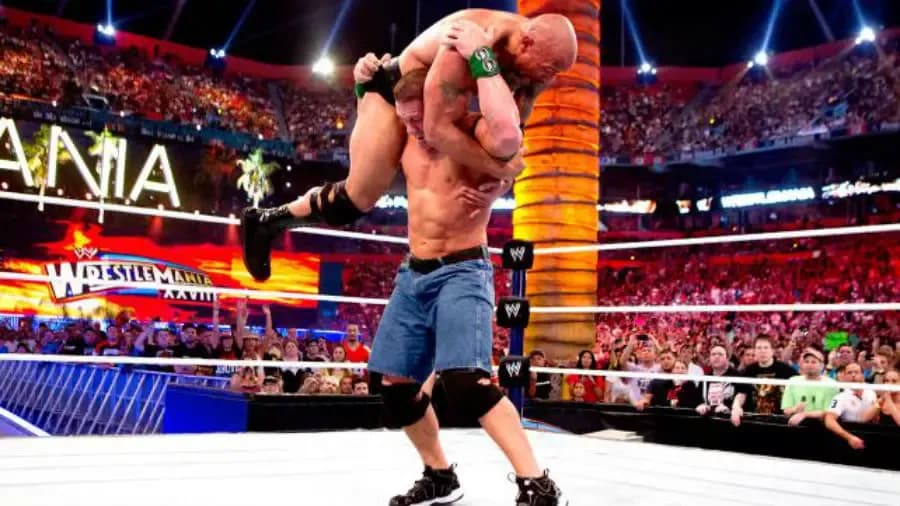
This was unquestionably the biggest WrestleMania bout of Cena's career, and one of the biggest 'Mania bouts of all time. The 2012 main event saw the two biggest stars of two separate generations collide in a dream match, drawing huge numbers in the process.
In terms of quality, this main event doesn't belong in the same category as other modern counterparts such as Lesnar vs. Reigns, Michaels vs. Undertaker II, or 'Taker vs. Edge - but it still exceeded expectations.
Despite his last singles match coming nine years earlier (against Goldberg), Rocky proved that he was still capable. His ability to entertain an audience was never in doubt, but his actual ring work was still more or less intact too.
In what could certainly be regarded as a surprise, Cena actually lost the match - perhaps the biggest defeat of his career. Of course, this result set up a less well-received rematch the following year, but at the time it genuinely felt like a big deal.
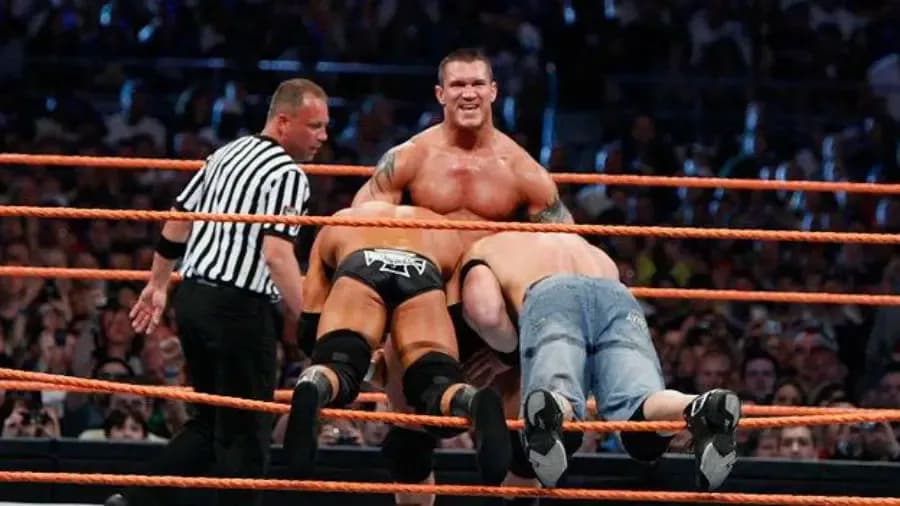
This is one of those matches that sounds like a huge main event showdown, but actually isn't mentioned too often. Despite Cena, Orton, and Triple H being three of the biggest stars in WWE history, their Triple Threat at WrestleMania XXIV isn't particularly well-remembered.
It's a shame too, because all three men put on a good show - only to be overshadowed by the Undertaker vs. Edge main event (and the novelty Floyd Mayweather Jr. vs. Big Show bout, widely regarded as one of the best celebrity matches ever).
The ending was probably the most memorable moment, as Cena's finisher was reversed into a Pedigree - only for Orton to punt Triple H in the head and cover Cena to retain his WWE Championship.
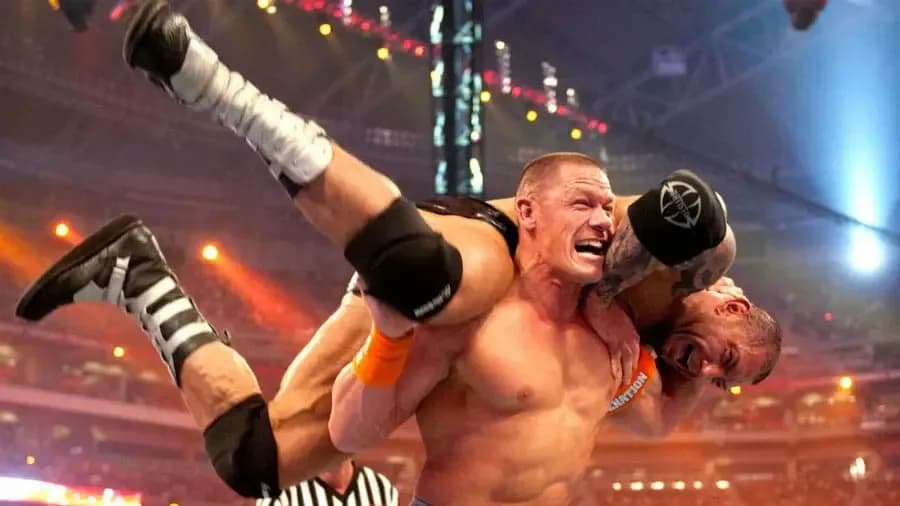
2010 saw a huge showdown between Cena and Batista, two of the major stars of the 2010s - and although it perhaps came a little too late in either man's career, it was a clever match in terms of pacing and execution.
The 13-minute duration may seem a little short for such an epic match-up, but actually served the bout better in the long run, as both men condensed the action and made the bout a consistently exciting one.
Cena defeated his heel opponent via submission, winning back the WWE Championship in the process. It was then followed by the big rematch between Undertaker and Shawn Michaels, a far longer, more critically acclaimed bout. With this in mind, the decision to cut Cena vs. Batista a little short was probably a wise one - and both men did themselves proud.
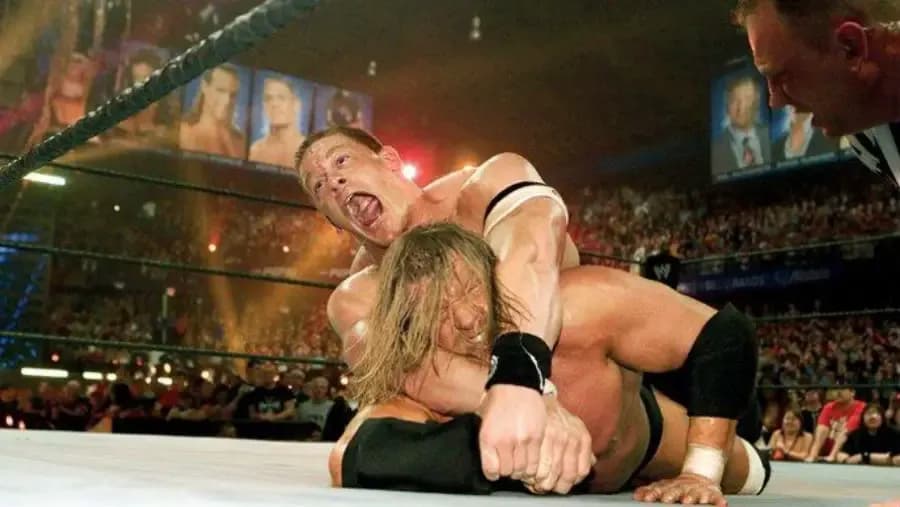
When it comes to big, career-defining triumphs, Cena's victory over Triple H in the main event of WrestleMania 22 was perhaps the most important of all. Main-eventing a 'Mania card for the first time, John seized the torch from The Game here in what felt like an important moment.
Although his ultimate victory wasn't particularly well-received, Cena certainly earned the right to call himself champion here, waging war against Triple H in a big 22-minute, sports-entertainment style main event.
There was nothing out of the ordinary, and neither man strayed far from the classic WWE formula, but everything was well executed. The finish saw Triple H thwart an STFU by reaching the ropes, only to have his Pedigree reversed into another STFU in the middle of the ring. He tapped out clean, and Cena retained his WWE Championship.
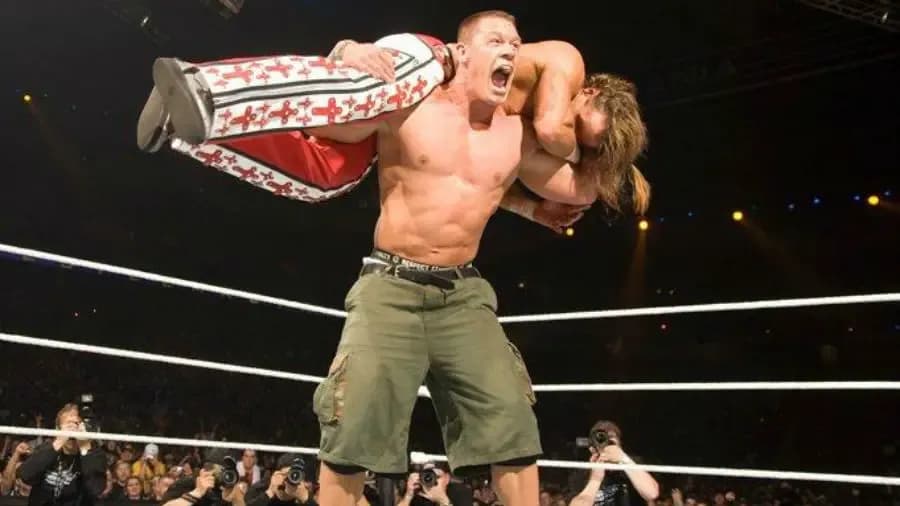
Unfortunately for Triple H, a recurring theme of his career is being outdone by Shawn Michaels - and it happened again at WrestleMania 23. A year after Cena had one of his best 'Mania matches against The Game, he topped it with a longer, more dramatic, and simply better main event against HBK.
The bout may not be Michaels' best WrestleMania match (considering his incredible bouts with Undertaker in 2009 and 2010, his innovative ladder match with Razor Ramon in 1994, and his emotional farewell to Ric Flair in 2008) - but it's certainly Cena's best performance on the big stage.
Sadly, again, his victory wasn't very well received - but Michaels gained revenge a few weeks later in that mammoth televised match often cited as the best in Raw history. It is also regularly referred to as better than this bout, which sort of sums up Cena's WrestleMania history. Although by no means a run of matches to be sniffed at, his 'Mania moments have often been overshadowed by dodgy booking or the misfortune of appearing alongside some of the best WrestleMania matches of all time.
It is no hyperbole to say that Chyna changed the game when she arrived in 1997, with the Ninth Wonder of the World soon becoming one of the biggest stars in the industry.
Coming in as Triple H’s bodyguard, Chyna was instantly positioned as quite frankly, a hard-as-nails enforcer just begging for a fight. Didn’t matter who what where or why, if they got in Triple H’s way then Chyna would punch them square in the balls. And the crowd loved it.
As Triple H made his way up the card, Chyna’s visibility increased, and her propensity for testicular trauma ensured that Hunter won a litany of championships.
So effective was Chyna in the role that WWF eventually put her in the men’s singles division, as seemingly every other company on the planet debuted their own Chyna rip-offs – Asya we’re looking at you.
As Trips rode off with Stephanie McMahon, Chyna found herself the object of Eddie Guerrero’s affection, eventually succumbing to his charm and becoming his ‘Mamacita’ – a short-lived yet very popular pairing.
But it all comes back to that initial run with Triple H and D-Generation X, a role that set her on the path to superstardom, and earned a rightful place in the WWE Hall of Fame for Chyna.
A classic manager who did most of his work before WWF’s explosion in 1984, Captain Lou was the king of the tag scene, all but guaranteeing tag gold for whomever he was cornering.
Arguably Albano’s greatest contribution came as the catalyst for the Rock ‘n’ Wrestling Connection, with Albano slap bang in the middle of the action as he feuded with pop star Cyndi Lauper.
Although Albano was eventually unsuccessful in his war with Lauper, his stock rose dramatically, with Captain Lou turning face and managing the likes of Hulk Hogan, Andre the Giant, and any other faces who needed support against WWF’s ever-growing rogues gallery.
Captain Lou remained a tag specialist, first guiding the US Express to the tag titles, and later masterminding The British Bulldogs’ rise to the top, with Dynamite Kid and Davey Boy Smith defeating The Dream Team for the straps at WrestleMania 2.
After several years away from the company, Captain Lou would return in 1994 to oversee The Headshrinkers’ WWF Tag Title win with Afa, then would once again leave town, presumably returning to the Mushroom Kingdom. (He was Super Mario innit).
When Randy Savage made his grand arrival to the WWF in 1985, every manager in the game entered a bidding war for Savage’s signature, with Macho Man spurning all their advances in favour of the lovely Miss Elizabeth.
Pretty and demure, Elizabeth was a 180 from the wild and bombastic Macho Man, and watched on as Savage scooped up the Intercontinental Championship as he established himself as one of the greatest in-ring talents in the entire company.
Macho’s over-protectiveness of Elizabeth would be exploited by his opponents, and the nefarious Savage would even use Elizabeth as a shield in order to hit faces with a sly dig here and there.
As Savage moved up the card and turned face, Elizabeth stood by him every step of the way, watching on as Savage became WWF Champion at WrestleMania 4, and later managing the awesome Mega Powers as Savage teamed with Hulk Hogan.
Again, Randy’s possessiveness got the better of him, with Macho Man turning heel after ruthlessly attacking Hogan, thinking the Hulkster was making advances on Elizabeth.
Liz would walk away, but would return to Savage’s side several years later in one of WrestleMania’s most iconic moments.
In a world where everyone was an over-the-top caricature, Miss Elizabeth shone by being a normal human being, unafraid to show her vulnerability, as well as effortless class.
A multi-time WWF Tag Team Champion, Mr. Fuji swapped his ring tights for a tuxedo and bowler hat in 1985, becoming part of the new breed of dastardly heel managers as the remaining members of the ‘Triumvirate of Terror’ wound down their careers.
With his trusty cane and a pocket full of blinding salt, Fuji managed the affairs of George Steele and Don Muraco before taking charge of the awesome Demolition.
With Fuji on hand to break the rules, Demolition marched to the top of the tag division, winning the WWF Tag Titles and holding them for a record-setting 478 days. Fuji would eventually turn on the team for the inferior Powers of Pain though, silly sod.
Fuji would bounce from client to client until 1992, when he ditched the tux for a kimono and ushered the terrifying Yokozuna into the mainstream. With Fuji once again on hand to chuck salt in opponent’s eyes, Yoko bulldozed the entire roster to win the Royal Rumble, land two WWF Championships, crush Lex Luger’s main event hopes, and ended up tagging with Owen Hart to land the tag titles for fun.
Fuji would stay at Yoko’s side, even when he was usurped by Jim Cornette, and would corner Yoko going into WrestleMania 12 before retiring from the business.
Everyone’s favourite internet curmudgeon, Jim Cornette is undoubtedly one of the finest managers in wrestling history.
After his legendary run in the NWA, Jim formed SMW and eventually made his way to the WWF, serving as the ‘American Spokesman’ for WWF Champion Yokozuna.
Dressed in ugly suits and ready to smack someone with his tennis racket, Cornette would get heat like few could, working in tandem with Mr. Fuji as Yoko mowed down everyone in sight.
Off the back of this, Cornette formed Camp Cornette, with Yoko, Owen Hart, and The British Bulldog serving as the de facto heel crew of the New Generation, holding two tag titles during their run. Not satisfied with the amount of beef at his disposal, Cornette only went and brought in Vader, with ‘The Mastodon’ debuting by clattering Gorilla Monsoon before marching his way into the main event scene.
After Camp Cornette, James E. would serve as the mouthpiece for the odd NWA invasion of 1997 which was… something, before bringing actual killing machine Dan Severn into the WWF, complete with about fifteen championship title belts.
Whilst his WWF run never reached the heights of his run with the Midnight Express, Cornette packed as much in as he could, and if you needed a bombastic hyper mic man then you could do worse than give Jim a call.
With Vince McMahon deciding that he was bored of women’s wrestling, Sherri Martel was left in limbo, with the former WWF Women’s Champion transitioning full-time into a managerial role after moonlighting for several years.
First cornering Intercontinental Champion Honky Tonk Man as ‘Peggy Sue’, Martel would truly flourish as the frankly bonkers Queen Sherri at the side of the 'Macho King' Randy Savage.
Whereas Miss Elizabeth juxtaposed Savage’s madness with her calming presence, Sensational Sherri exacerbated it, screaming loads of twaddle about evil magic and destruction, whilst occasionally painted like a cat.
Absolutely bonkers.
After kicking Savage to the curb after he lost a retirement match to The Ultimate Warrior, Sherri would shack up with Ted DiBiase, and although Ted was past his prime he was still a massive star, and the always aggro Sherri would step in to give someone a literal shoeing when needed.
Sherri’s last major run in WWF came at the side of the newly heel singles breakout star Shawn Michaels, with Sherri besotted with the ‘sexy boy’. Shawn - being a horrible little man - pulled Sherri in harms way when Marty Jannetty attempted to smash his head in with a mirror, and Sherri would take a bash to the head so hard that she’d abandon both Rockers and corner Tatanka instead. Yikes.
After making his name in Memphis as the chief foil to Jerry Lawler, Jimmy Hart made his way to WWF in 1985 and instantly added some pedigree to his client base, cornering Intercontinental Champion Greg Valentine.
The Mouth of the South would also guide The Dream Team with Johnny V, before forming a new team to take the tag division by storm when he brought Jim Neidhart and Bret Hart together as The Hart Foundation.
Hart would also manage The Funks at this time, and would dub himself ‘The Colonel’ when cornering a newly heel Honky Tonk Man, keeping a close eye as he became a record-breaking Intercontinental Champion.
Clearly, Jimmy Hart had the golden touch.
Incessantly screaming into his megaphone made sure he was roundly booed week-in and week-out, and when his charges were at a disadvantage then Jimmy wouldn’t hesitate to use it as a weapon.
His chicanery ensured that The Nasty Boys wrangled the belts away from Bret and Anvil at WrestleMania 7, with Jimmy using his helmet as a foreign object.
Weirdly, Hart would end up fulfilling the rare role of a babyface manager in WWF, when after runs with The Natural Disasters and tag champs Money Inc., Jimmy would begin to represent Brutus Beefcake and Hulk Hogan, cornering the Hulkster for his WWF Championship win at WrestleMania 9.
Oh, and he wrote Shawn Michaels’ theme too. Legend.
Quite frankly, The Undertaker and Brother Love pairing wasn't a good fit. What The Deadman needed was some kind of mortuary assistant, or a pallbearer to look after his affairs.
Step forward Paul Bearer - ohhh now I get it - a pasty-faced grim mortician plucked straight from a Universal Horror flick and plonked next to ‘The Phenom’, complete with a mystical urn that contained either fog, smoke, a massive light, or actual human ashes depending on what day it was.
The addition of Bearer completed the Taker gimmick, with Bearer creepily praising ‘his’ Undertaker, cutting the promos whilst Taker just stood there being all tall and dead. The two remained together for six years, with Taker lifting the WWF Championship during this time, before Bearer betrayed Taker and sided with the deranged Mankind, as well as a short spell with Vader.
With Mankind, Bearer changed his act somewhat, but was still a creepy little ghoul of a man, with his wretchedness going to new heights when he unleashed Kane on the world at Badd Blood 1997.
Don’t worry though, because, after Kane Bearer settled down… sorry no he didn’t, he formed the Ministry of Darkness with Taker and tried embalming people on live TV.
Bearer was campy, over the top, and utterly ridiculous, but that’s why he was so good. He made us believe that a pair of 7ft magic zombies could squash a combat league, and could command the audience simply by saying “ooooohhhhh yessssss”.
Quite simply one of the greatest talkers and most brilliant minds in wrestling history, Paul Heyman was the mastermind behind the awesome Dangerous Alliance in WCW before changing the entire industry with ECW in the mid-1990s.
After ECW died and was bought by WWF, Heyman joined WWF, first as a commentator, then as the mouthpiece for the disastrous WCW/ECW Alliance with Shane and Stephanie McMahon.
However, as an on-screen force in WWE, Heyman was just getting started and further changed the landscape of the business when he brought Brock Lesnar to our screens.
Presiding over the ‘Next Big Thing’s’ affairs, Heyman did the deals and the talking as Brock literally ate everyone who challenged him in the fed.
Heyman would also look after main event talents The Big Show and Kurt Angle, then after Brock left town, Heyman would depart the company, returning to run the ill-fated WWE ECW, including a second stint as ECW Champion Big Show’s manager.
However, it wasn’t until Brock Lesnar returned that Heyman truly cemented himself as the best in the business, advocating for ‘The Beast’ as Brock snapped arms and collected championships for fun.
With Brock only working when he could be bothered, Heyman made himself useful by joining biggest star in the company CM Punk which was also incredible.
Ok so his runs with Curtis Axel and Cesaro were false dawns, but Heyman always fit Brock well, and when a newly heel Roman Reigns needed a special counsel, who else was fit for the job than Heyman?
A once-in-a-generation talker who masterminded dozens of world title wins, Heyman is for many the greatest manager of all time.
But for us there’s one better….
The measuring stick by which all managers are compared to, Bobby ‘The Brain’ Heenan could make chicken salad out of chicken sludge, and could turn a great talent into a legend.
The brains behind the nefarious Heenan Family in the AWA and WWF, Bobby surrounded himself with winners and future hall of famers, throwing his weight behind the likes of Harley Race, The Brainbusters, ‘Ravishing’ Rick Rude, Mr. Perfect, Paul Orndorff, Haku, and a little known talent called Andre the Giant.
Indeed, it was Heenan’s corrupting of career babyface Andre that was his greatest work, getting inside the legend’s head as he sought to use him as a weapon in his fight against Hulkamania, with Heenan advising Andre for his monumental clash with Hogan at WrestleMania 3.
Quick-witted, oozing credibility, and not afraid to look like a tit and bump like a madman to get the face over, ‘The Weasel’ turned the role of a wrestling manager into an art form, whilst also cementing himself as one of the greatest colour commentators of all time too, the show-off.
Although Brain would concentrate more on his announcing work as the 90s rolled on, he would still retain some impressive clients, bringing in the ‘Real World’s Champion’ Ric Flair to the WWF in 1991, and later following that with the introduction of ‘The Narcissist’ Lex Luger.
Quite simply, no one could do it quite like Heenan, and whilst many have come close, none will ever possess ‘The Brain’ that Bobby Heenan had.
The measuring stick by which all managers are compared to, Bobby ‘The Brain’ Heenan could make chicken salad out of chicken sludge, and could turn a great talent into a legend.
The brains behind the nefarious Heenan Family in the AWA and WWF, Bobby surrounded himself with winners and future hall of famers, throwing his weight behind the likes of Harley Race, The Brainbusters, ‘Ravishing’ Rick Rude, Mr. Perfect, Paul Orndorff, Haku, and a little known talent called Andre the Giant.
Indeed, it was Heenan’s corrupting of career babyface Andre that was his greatest work, getting inside the legend’s head as he sought to use him as a weapon in his fight against Hulkamania, with Heenan advising Andre for his monumental clash with Hogan at WrestleMania 3.
Quick-witted, oozing credibility, and not afraid to look like a tit and bump like a madman to get the face over, ‘The Weasel’ turned the role of a wrestling manager into an art form, whilst also cementing himself as one of the greatest colour commentators of all time too, the show-off.
Although Brain would concentrate more on his announcing work as the 90s rolled on, he would still retain some impressive clients, bringing in the ‘Real World’s Champion’ Ric Flair to the WWF in 1991, and later following that with the introduction of ‘The Narcissist’ Lex Luger.
Quite simply, no one could do it quite like Heenan, and whilst many have come close, none will ever possess ‘The Brain’ that Bobby Heenan had.